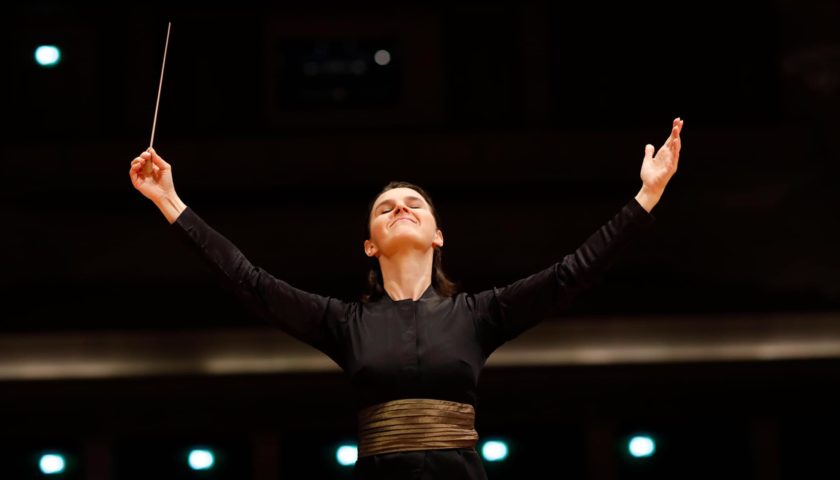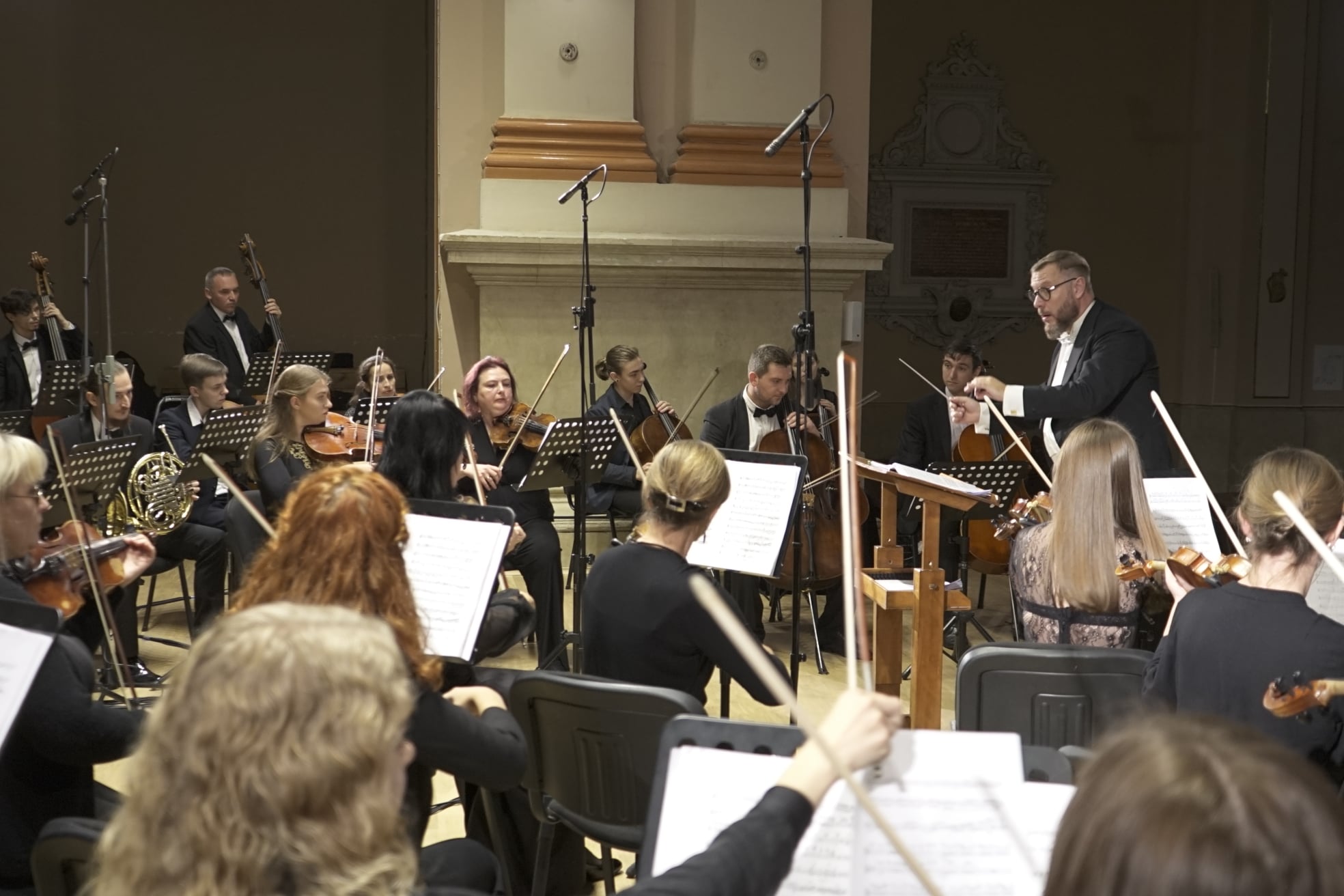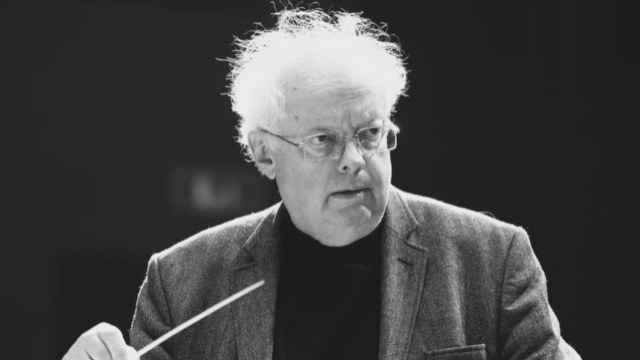On 30 November 2020, Ukrainian conductor Oksana Lyniv was awarded the prestigious Oper! Awards in the category of Best Conductor, founded by the opera magazine Oper! Das Magazin.

Hard work both in Ukraine and worldwide is behind the award. Representing the third generation of conductors and musicians in her family, Lyniv is the founder and art director of the LvivMozArt International Classical Music Festival, and the founder of the Youth Symphony Orchestra in Ukraine. She was the deputy chief conductor of the Odesa Opera, moved to the Bavarian State Opera as Kirill Petrenko’s assistant in 2013. In 2019, Lyniv became widely known when she became the first female chief conductor of the Graz Opera and the Graz Philharmonic Orchestra.
Working on the best international scenes worldwide, Oksana Lyniv was invited to the 2021 Bayreuth Festival founded by Richard Wagner in 1876 and became the first female conductor opening the festival for its 145-year-long history. In an interview with Die Welt, Katharina Wagner, festival director, announced that Lyniv will open the festival with Der Fliegende Holländer.
Although best world stages are still almost exclusively dominated by male conductors, Lyniv told us that she didn’t face any prejudices or obstacles in her career because she is a woman or from Ukraine. Only professionalism matters.
In an interview with Ukrainer, she also stressed that if you are really successful, you can’t limit yourself to one country, but should perform on the best world stages. At the same time, visiting Ukraine each year, Lyniv continues working on her projects in many Ukrainian cities including Lviv, which she says is her hometown, where she graduated from the Lysenko Music Academy.
Ukrainian Shchedryk, known worldwide as Carol of the Bells, is world-famous. What other Ukrainian composers and songs do you think could become similar cultural markers of Ukraine?
Shchedryk is certainly popular, but the authorship itself must be constantly confirmed. The name of Mykola Leontovych [who made the first arrangement of Shchedryk based on a folksong] is currently known mainly to Ukrainians, so there is still a lot of work to be done in this area. In my concerts, I popularize the works of many Ukrainian composers, classical and contemporary. For example, Mykola Lysenko, Borys Liatoshynskyi, Yevhen Stankovych, Leonid Hrabovskyi, Myroslav Skoryk, Vitaliy Hubarenko, Zoltan Almashi, Bohdan Segin, Bohdana Froliak… Ukraine is rich in talented artists who need to be discovered both by Ukrainians and the world.
Oksana Lyniv, Dudaryk Choir, and the Youth Symphony Orchestra of Ukraine perform Shchedryk in the arrangement of contemporary Ukrainian composer Ivan Nebesnyi:
[embedyt] https://www.youtube.com/watch?v=9KgubuBPsJg[/embedyt]Continuing the previous question – are there any other Ukrainian musical works that are so recognizable to the world?
The situation with Shchedryk is unique and its world popularity has not been surpassed yet. But the Ukrainian melos is very popular in the world: often people do not know that Ukrainian folk songs are in one work of a famous composer or another. Beethoven’s music also has folk melodies of Ukrainians, let alone Tchaikovsky…
I was once shocked by the fact that Bortnianskyi’s music was used during the German military parade, where the German ruling elite was present. This is a tradition of the 19th century when the music of the Ukrainian composer was popular at the royal court of Frederick William III of Prussia. And this fact is described only in the German version of Wikipedia about Bortnianskyi’s biography.
From your experience, how are Ukrainian music and Ukraine perceived abroad? Can you outline any dynamics – five years ago and now? Given that Ukraine has been at the center of political events since 2013, attention to the country, and in particular to its culture, is constantly growing. And we should use this situation and present our traditions and culture at a high level, confirming a strong artistic position in the world. No matter in which hall I perform, after performing Ukrainian music I always receive positive reviews. For example, the French-German cultural channel ARTE plans to release a documentary about me on the occasion of my debut at the Bayreuth Festival. And they want me to tell not only about my professional career but also about the history and culture of Ukraine, as over the past seven years the world has been learning about our country from the tragic news of eastern Ukraine. That’s why we plan to film Kharkiv during the Embroidered project, as well as in Odesa, where I worked for 5 years at the Opera House and, of course, in Lviv – in preparation for the LvivMozArt festival. Obviously, the income difference is a strong argument why many Ukrainian musicians work in other countries. What are the other reasons for Ukrainian musicians being in demand abroad? It is necessary to divide your questions into separate points: the issue of fees and demand. After all, the demand does not depend on nationality in the art world, it all depends on the level of your qualification as a musician. Therefore, there is a flip side to the coin: professionals who strive to constantly improve will conquer higher and higher peaks, and these peaks are international competitions, the best concert halls, recognized orchestras, and world-class opera houses. Therefore, we should rather be proud that the names of prominent Ukrainians are part of the history of world music culture. As for rewards, yes, it is important for a musician to feel the value of their work, because we work and acquire skills from childhood. Ukraine does not currently provide sufficient support at the European level for artists, but there is progress. Much has changed for the better in recent years. Some groups of philanthropists are supporting huge high-value artistic projects and ideas. There is also the Ukrainian Cultural Foundation and the Ukrainian Institute, which provide opportunities to implement various projects in Ukraine and abroad. Are there any significant differences between music education in Ukraine and European countries from your experience? Yes, there is. In my opinion, European education gives great motivation and support to students, and the system itself is interested in your professional growth. Ukrainian music education in some sectors remains very strong, but there is a problem in accessing relevant information, professional literature, and sheet music. Unfortunately, 90% of our libraries consist of literature that has been considered obsolete in Europe for decades. If you could describe in one sentence the weakest side of Ukrainian classical music and its modern performance, how would you describe it? Lack of a strong state cultural strategy. In your opinion, how well does Ukrainian cultural diplomacy work abroad? What projects can you recommend following? Cultural diplomacy works and I can proudly say that we have created more than one project with Ukrainian diplomatic institutions. Embassies, consulates in Austria, Germany, Switzerland, the Ukrainian Cultural Institute are eager to cooperate and support individual projects, both the Youth Symphony Orchestra of Ukraine and the LvivMozArt festival. Recently LvivMozArt started digitalization and scientific research of documentation related to Franz Xaver Mozart. LvivMozArt International Festival of classical music launches a new initiative – Mozartiana Galicia, which consists in digitization and scientific research of documentation related to the stay, work and activities of Franz Xaver Mozart, the youngest son of the famous Viennese classic, in Galicia, where he spent almost 30 years of his life and changed the cultural landscape of the region. The project starts at a significant time: this year we will celebrate the 230th anniversary of the birth of the youngest of Mozarts, wrote Lyniv on her Facebook page. https://www.facebook.com/permalink.php?story_fbid=2872994322956485&id=1686502611605668&__cft__[0]=AZVnR9G8vv3OocOBbd_KQfrFNnuW6By8GEKi9zmzFntcsp7HbaqTjUEu61gvfhjyv9DNk3dBIwfGUUWuBtPfyFIXza396G0sxMM5vhgtDoiDA8NqPBT6F3qgBFwIYIcZaVKlpHi21OkPV0j5UmgZv6SmlkuoTpJAghedxa5k94sDtw&__tn__=%2CO%2CP-R In an interview with Ukrainer, you mentioned the success of the Youth Symphony Orchestra of Ukraine at the Konzerthaus in Berlin in 2017. Could you share how you managed to get such a young and new orchestra to take part in the festival despite precautions from the German side? The main trump card of many of my projects is my already internationally known name.In January 2021, Oksana Lyniv conducted a special Christmas concert from her most known art project LvivMozArt. The recording was made in Lviv in the Church of St. Andrew the Apostle. The concert included masterpieces of classics by Mozart, Beethoven, Saint-Saëns, and arrangements of favorite Ukrainian carols by modern composers Mariya Oliynyk, Ivan Nebesnyi, and Yuriy Romaniv
[embedyt] https://www.youtube.com/watch?v=-eiU6kbAkGU[/embedyt] 
 Oksana Lyniv and The Youth Symphony Orchestra of Ukraine at the stage of the Young Euro Classics (2018). Source: ysou.com.ua
Oksana Lyniv and The Youth Symphony Orchestra of Ukraine at the stage of the Young Euro Classics (2018). Source: ysou.com.ua

Russia has mastered skills to put the right emphasis for positioning its culture in the world, and this policy has been working for centuries. As a result, Russian culture is now highly valued in the world, despite political criticism, and famous Russian artists are sponsored by the state. Russia constantly invests in their promotion.
You work all over Europe, including in Ukraine. But what place do you consider your home, and how often do you go there?
Lviv. I come from time to time when there is an opportunity. I have to dedicate every free period to the development of projects that operate in Ukraine. Sometimes I can only fly for a few days in a long time, sometimes I can stay for a week.
You have already created two big successful projects in Ukraine and performed on many of the best stages in the world. What’s next? Are you thinking about any change or a new project?
There are more successful projects. Last year, Yaryna Vynnytska and I organized the Ark Ukraine: Music. What is important to me is not the number of new projects, but the successful formation and development of existing ones.
What gives you the strength to follow such a tight schedule in your work?
Understanding of my mission and the value of what I do. And, of course, willpower.
Ark Ukraine: Music[embedyt] https://www.youtube.com/watch?v=SXcA3u7Y59w&t=1479s[/embedyt]
Read also:
- Explosion of new Ukrainian music after introduction of protectionist language quotas
- Polyphony Project: discovering the largest online archive of traditional Ukrainian songs
- Bondi Vesolovsky and Yabtso Jazz: swinging Lviv in the 1920s-30s
- Famed Ukrainian composer Myroslav Skoryk dies aged 81. Here is the music we’ll remember him by
- What it means to organize a major music festival in Kyiv – interview with Atlas Weekend founder
- GogolTrain: Europe’s first art train amps up Ukraine’s cultural mobility
- All you wanted to know about Ukraine in one book and on one YouTube channel
- Travel to Ukraine online — a tourist guide for quarantine times
- Takflix: a platform where you can finally watch Ukrainian films online








